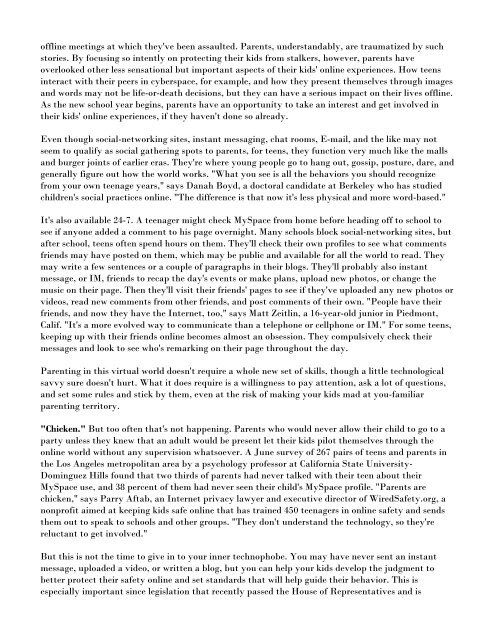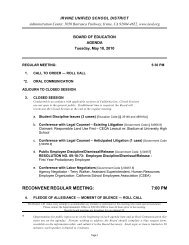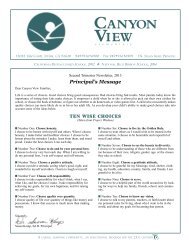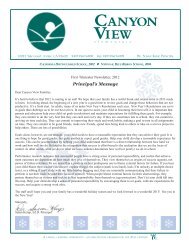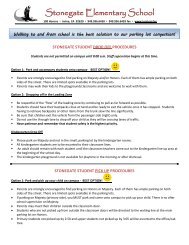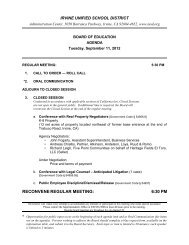You also want an ePaper? Increase the reach of your titles
YUMPU automatically turns print PDFs into web optimized ePapers that Google loves.
offline meetings at which they've been assaulted. Parents, understandably, are traumatized by such<br />
stories. By focusing so intently on protecting their kids from stalkers, however, parents have<br />
overlooked other less sensational but important aspects of their kids' online experiences. How teens<br />
interact with their peers in cyberspace, for example, and how they present themselves through images<br />
and words may not be life-or-death decisions, but they can have a serious impact on their lives offline.<br />
As the new school year begins, parents have an opportunity to take an interest and get involved in<br />
their kids' online experiences, if they haven't done so already.<br />
Even though social-networking sites, instant messaging, chat rooms, E-mail, and the like may not<br />
seem to qualify as social gathering spots to parents, for teens, they function very much like the malls<br />
and burger joints of earlier eras. They're where young people go to hang out, gossip, posture, dare, and<br />
generally figure out how the world works. "What you see is all the behaviors you should recognize<br />
from your own teenage years," says Danah Boyd, a doctoral candidate at Berkeley who has studied<br />
children's social practices online. "The difference is that now it's less physical and more word-based."<br />
It's also available 24-7. A teenager might check <strong>MySpace</strong> from home before heading off to school to<br />
see if anyone added a comment to his page overnight. Many schools block social-networking sites, but<br />
after school, teens often spend hours on them. They'll check their own profiles to see what comments<br />
friends may have posted on them, which may be public and available for all the world to read. They<br />
may write a few sentences or a couple of paragraphs in their blogs. They'll probably also instant<br />
message, or IM, friends to recap the day's events or make plans, upload new photos, or change the<br />
music on their page. Then they'll visit their friends' pages to see if they've uploaded any new photos or<br />
videos, read new comments from other friends, and post comments of their own. "People have their<br />
friends, and now they have the Internet, too," says Matt Zeitlin, a 16-year-old junior in Piedmont,<br />
Calif. "It's a more evolved way to communicate than a telephone or cellphone or IM." For some teens,<br />
keeping up with their friends online becomes almost an obsession. They compulsively check their<br />
messages and look to see who's remarking on their page throughout the day.<br />
Parenting in this virtual world doesn't require a whole new set of skills, though a little technological<br />
savvy sure doesn't hurt. What it does require is a willingness to pay attention, ask a lot of questions,<br />
and set some rules and stick by them, even at the risk of making your kids mad at you-familiar<br />
parenting territory.<br />
"Chicken." But too often that's not happening. Parents who would never allow their child to go to a<br />
party unless they knew that an adult would be present let their kids pilot themselves through the<br />
online world without any supervision whatsoever. A June survey of 267 pairs of teens and parents in<br />
the Los Angeles metropolitan area by a psychology professor at California State University-<br />
Dominguez Hills found that two thirds of parents had never talked with their teen about their<br />
<strong>MySpace</strong> use, and 38 percent of them had never seen their child's <strong>MySpace</strong> profile. "Parents are<br />
chicken," says Parry Aftab, an Internet privacy lawyer and executive director of WiredSafety.org, a<br />
nonprofit aimed at keeping kids safe online that has trained 450 teenagers in online safety and sends<br />
them out to speak to schools and other groups. "They don't understand the technology, so they're<br />
reluctant to get involved."<br />
But this is not the time to give in to your inner technophobe. You may have never sent an instant<br />
message, uploaded a video, or written a blog, but you can help your kids develop the judgment to<br />
better protect their safety online and set standards that will help guide their behavior. This is<br />
especially important since legislation that recently passed the House of Representatives and is


